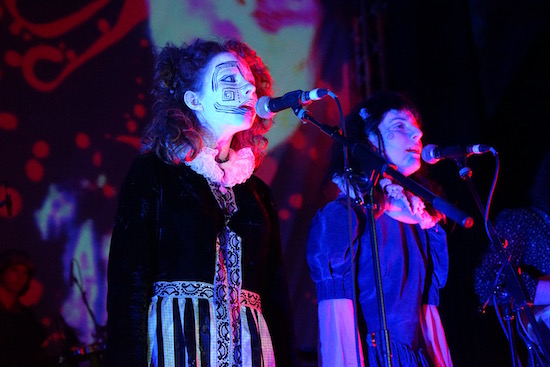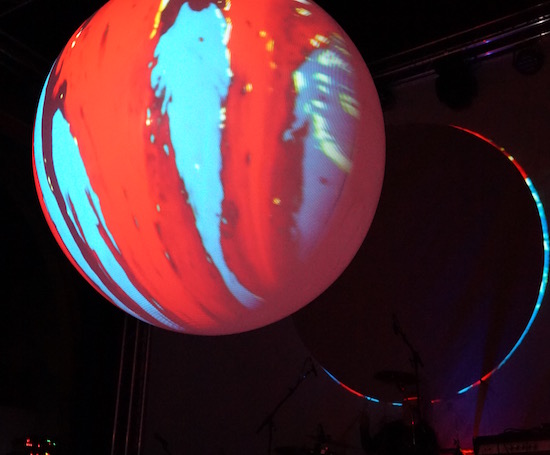Adrena Adrena. All photos By Andrea Shamlou
The small Sussex town of Lewes has a distinct and often contradictory character. Traditional and conservative in many respects, it also prides itself on encouraging eccentricity, individualism and free thinking. The surface veneer of quaint respectability masks frequent eruptions of joyous anarchy, most notably at the town’s famous bonfire night festivities, which manage to feel life-threatening and life-affirming at the same time. On the downside, Lewes’s strong libertarian streak can sometimes feel more self-congratulatory than genuinely inclusive, and combined with the strong undercurrent of supernatural rural English weirdness, this can occasionally conspire to make the town feel like an unsettling hybrid of Children Of The Stones and The League Of Gentlemen.
Lewes also punches above its weight in terms of interesting gigs. A long-established and thriving folk scene encouraged the acclaimed return to live performance by local resident Shirley Collins, but the town also shows a marked preference for the psychedelic. Last year the 200-capacity Con Club hosted sold-out shows by Acid Mothers Temple, Faust and the Sun Ra Arkestra, and the Lewes Psych Fest has been at the vanguard of the town’s musical renaissance. Started in 2009 by DJ-producer Richard Norris and Chris Tomsett (who still co-organises the festival and creates its distinctive visual environment in his Innerstrings Lightshow guise), Lewes was almost certainly the UK’s first such event, and one of the first anywhere in the world after the Austin Psych Fest in Texas, which began in 2008. (The Liverpool International Festival of Psychedelia kicked off in 2012.)
In that time the Lewes Psych Fest certainly hasn’t stood still. Alongside acts like The Notorious Hi-Fi Killers, The Time & Space Machine, Voice Of The Seven Thunders and The Sound Carriers, early festivals also featured house band Furry Hopkins performing Syd Barrett covers and an audience contingent who read ‘psych fest’ as ‘60s fancy dress party’, attempting perhaps to recreate the locally famous night when Pink Floyd played the Town Hall here back in 1968. In 2012 the festival moved to Zu Studios for a notorious all-nighter that was perhaps its most genuinely psychedelic manifestation, and then took three years off to recover before returning to its original home, the modest converted church that is the All Saints Centre, in 2016.
Now co-run with established independent Brighton promoters Melting Vinyl, the current incarnation of Lewes Psych Fest is a forward-looking, professionally run event that has left retro associations long behind. This year it stretched to two sold-out days for the first time since 2010, and not once did I hear any of the between-act DJs – long-time resident Danny Webb, Polly Miles of Brighton psych promoters Acid Box, and scene stalwart DJ Messytrax – play a song from the 1960s or 70s. There was no fancy dress and even Innerstrings’ armoury of authentic oil slides is now augmented with modern technology and live digital mixing, where the bands are filmed onstage and instantly projected into the chaotic, colour-blitzed collage on the large white screen behind them.
Of those bands, the young lads in The Vinyl Staircase were probably born in the mid-90s, but their music sounds like a confident, melodic amalgam of indie styles from five or so years before that. Wax Machine come on like the children of Gong, with flute, saxophone and violin alongside guitars, bass, drums and twin female vocals. The seven-piece hit a free krautrock groove that’s more space-jazz than motorik, while their clothes and make-up evoke a medieval witches mass as recreated by Derek Jarman.
A modern take on the notion of a happening comes from Adrena Adrena, the collaboration between ex-Boredoms drummer E-Da Kazuhisa and visual artist Daisy Dickinson. E-Da plays drums and triggers synthesiser parts while a giant white balloon hovers centre stage and Daisy’s inventively trippy moving images are projected upon it. The results are both mind-melting and rhythmically irresistible- you can either dance wildly or gaze open-mouthed at the sphere like it’s a portal to another universe, or somehow attempt both at once.

Wax Machine
Friday night headliners Wolf People are joined by Dungen’s Reine Fiske on third guitar and occasional faux-mellotron, and explicitly connect 60s/70s bluesy hard rock with the British folk tradition, making music that’s not so much retro as timeless and eternal. Wolf People never claim to be cool or modern – they write their name with runes, for Odin’s sake – but they are the best at what they do, which is playing classic melodic guitar rock without pomp or pretension. Tonight they go full Old Grey Whistle Test, stretching their songs into glorious, ridiculous three-guitar jams, their duelling axes projected in brain-frazzling swirls on the screen behind them.
On Saturday, Melt Dunes’ dense, rhythmic guitar attack has the fiery intensity of Hookworms’ early shows coupled with dark, dreamy post-punk, while Julien Gasc’s engaging, organ-led songs are backed by a band that includes a pedal steel player, adding plangent colours and textures that are more cosmic than country. Headliners Josefin Öhrn & The Liberation channel The Velvet Underground and The Great Society into languid-yet-driving fuzz-pop.
But the night belongs to Soccer 96. The drums and analogue synth duo fill the hall with a slow-building avalanche of tones and rhythms that suddenly shift and lock together, triggering Pavlovian responses in middle-aged former ravers, all suddenly transported back to the first time they double-dropped at an orbital rave and losing their shit all over again as a result. The band draw as much on the polyrhythmic textures of cosmic jazz as the propulsive impetus of classic techno, reminding us that psychedelia was always an invitation to the dance.
Like Lewes, psychedelic music has its traditions. Some are worth hanging onto, even as others must be left behind if an avowed commitment to radicalism, freedom and expanding horizons is to be followed. We needn’t close the door on the 60s entirely (personally I’d like to see a lot more people dressing up like mind-blown dandies), but the way to use tropes of the past is to find what is strange and unfamiliar, not what’s comfortable and nostalgic. Anyone who was at that Pink Floyd concert at Lewes Town Hall in 1968 would find the Psych Fest very different. But I think they would find the same indefinable psychedelic spirit still within the town’s walls, very much present and alive.


